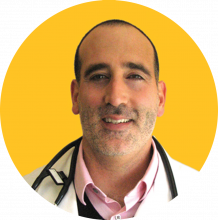Chronic insomnia (hereby referred to as “insomnia”) is a common problem seen in clinical practice. It has been defined as unsatisfactory sleep that impacts daily functioning, and for diagnostic purposes it happens for at least 3 nights each week for a minimum of 3 months. The majority of insomnia cases are associated with other medical conditions, giving rise to a more appropriate diagnosis of “comorbid insomnia.” Dr Jonathan Prousky has been working with insomnia patients for over 20 years and has found that a combination of psychological and behavioral therapies – such as, stimulus control therapy, sleep restriction therapy, progressive muscle relaxation, and cognitive therapy – in addition to evidence-based natural health products, yield the best clinical outcomes. Integrative clinicians are well positioned to provide expertise in the treatment of insomnia, especially since these approaches are safer than conventional treatments, and have proven efficacy given their positive impact on both sleep physiology and sleep metrics.
Learning Objectives
By the end of this lecture, the clinician will be able to:
- Understand the definition and utility of insomnia disorder.
- Describe what “Good Sleep” is and why it needs to be explained to patients.
- Discuss the enormity of sleep disorders, including the personal and societal costs that result from insomnia.
- Apply the 3 P model of insomnia to patients.
- Link hyperarousal and activation of the hypothalamic-pituitary adrenal axis to chronic sleep problems.
- Explain the basic pathophysiology of insomnia.
- Properly evaluate insomnia patients.
- Apply basic psychological and behavioural approaches to their insomnia patients.
- Discuss conventional treatment options, such as short-intermediate acting benzodiazepine, benzodiazepine receptor agonists, and sedating antidepressant medication.
- Apply appropriate evidenced-based natural health products when minimizing the persistent impacts of insomnia.
CE Credits
CONO: Category A General – 0.75 credit; Pharmacology – 0.25 credit
British Columbia: Category C General – 1.0 credit
AANP: General – 0.75 credit; Pharmacology – 0.25 credit
OANP/OBNM: For Oregon attendees seeking OBNM approved CE credits, please note that this event has not been submitted for approval to the OBNM. CE certificate will be issued upon individual request.

Dr Jonathan Prousky, ND, MSc, MA, RP
(ND, Bastyr University, 1998; MSc, University of London, 2008; MA, Yorkville University, 2016; RP, College of Registered Psychotherapists of Ontario, 2017) is the Chief Naturopathic Medical Officer at the Canadian College of Naturopathic Medicine (Toronto, Ontario).
His primary responsibility is ensuring the delivery of safe and effective naturopathic medical care to patients, as well as ensuring the safety and effectiveness of the medical training in the naturopathic program. His clinical practice focus is primarily on the evaluation and management of mental health problems. He has spent over 20 years advocating for patients that wish to receive complementary and alternative means to help their mental struggles.
He was the first naturopathic doctor to receive the “Orthomolecular Doctor of the Year” award in 2010, and later to be inducted into the Orthomolecular Hall of Fame in 2017. Dr Prousky is the author of more than 60 scholarly publications, and several texts including Anxiety: Orthomolecular Diagnosis and Treatment, and the Textbook of Integrative Clinical Nutrition.

